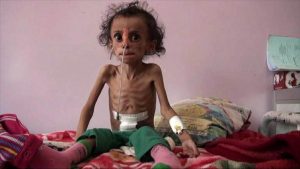What and Who Can Stop the Humanitarian Crisis, War in Yemen?
YemenExtra
By: Shefa’a Abdullah
Despite the scale of the humanitarian crisis in Yemen, famine and cholera and the scarcity of health services because of the war, the West is still moving very slowly to find a solution that will end the suffering of Yemeni people.

The ongoing tragedies in Yemen are not interrupted and the news of killing dozens of civilians, mostly women and children, presented at a wedding or a funeal, by coalition’s raids, are nothing more than an example of death news coming from that country.
Since the beginning of the war on Yemen, in March 2015, the war left at least “38,500 between dead, injured and disabled people, 2949 of them are children, 2060 are women and 8979 are men , all are civilians, according to the Ministry of Human Rights.
While 296834 Yemeni citizen were killed indirectly as a result of the coalition , 247,000 children die out of malnutrition, other17608 died due to inability to travel for treatment, while 1200 died from kidney failure, 2236 died by cholera epidemic and 450 abortions cases
In addition, there are 22,357 civilians, including 2,689 children, 2,284 women, who are still suffering from the lack of medicines, medical supplies and proper treatment because of the blockade, amid the silence of the world.
As well as, more than 81 historical and archaeological sites, including religious, temples and mosques, and historic cities were destroyed by the Saudi-led coalition since the beginning of this war.

Great nations, international organizations and international decision-makers have not really moved to stop the humanitarian crisis and stop the three years old war in one of the world’s poorest countries, Yemen.
Among all the EU countries, only the German government has declared a moratorium on the export of its arms to the countries participating in the war on Yemen. The German decision negatively affected Saudi-German relations.
As a result of the attitude of Germany, the Saudi Crown, Mohammed Bin Salman, strengthened his relations with France, which led president of France, Emmanuel Makron,to defended his country’s supply of arms Saudi Arabia.
The same position was reiterated in Britain, which recently signed agreements with Saudi Arabia worth 100 billion dollars, as London said: “Saudi Arabia’s continued commitment to ensure that the military campaign against Yemen is conducted in accordance with international humanitarian law.”
“Britain and France have no interest in talking about the humanitarian disaster in Yemen as long as they sell weapons to Riyadh.”
After the coalition was betting on a quick victory over the Yemenis Huthis, it lasted long and the Houthis managed to continue to control strategic areas in the country, making the balance of power within Yemen the main determinant of the crisis’s coming to an end, in light of the continuation of the Yemeni crisis, which does not appear that the solution will come from the Western capitals and the solution remains the reality of the war.

